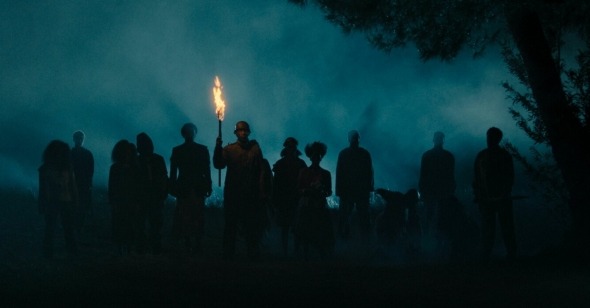Grim Tidings
By Vikram Murthi
Tommy Guns
Dr. Carlos Conceição, Portugal/France/Angola, Kino Lorber
In Tommy Guns, director Carlos Conceição depicts the victims of Portuguese rule in Angola as literal zombies. His approach takes a page from postcolonial studies, in which spectral metaphors abound: the legacy of imperialism haunts people long after colonizers have departed, poisoning the culture even without a corporeal presence. Conceição creates a neat implicit contrast with this supernatural invocation: if colonialism is a spirit without a body, then its sufferers are bodies without spirits.
Beginning in rural Angola in 1974, a year before the country would gain its independence after decades of guerilla warfare, Tommy Guns depicts a liminal space and time. It’s the last gasp of Portuguese supremacy and the rising power of the Angolan people, though it’s unclear how control will ultimately shake out. Conceição splits the film into three loose sections, each more narratively conventional than the last. The first is its most diffuse and sensorial, featuring a variety of characters in brief vignettes of casual violence and turmoil. Local revolutionaries run a colonialist out of her home to take back their land. Tribeswomen hold a funeral for one of their own but must abstain from traditional mourning to avoid detection from patrolling Portuguese soldiers. A tribal girl impulsively sleeps with a solider in the woods, the two sensually exploring each other’s bodies, before he dispassionately shoots her. These scenes, eventually punctuated by the late appearance of an opening title card, have a familiar arthouse patina—fluid camera movements, minimal dialogue, shadow-accentuated lighting. Names like Claire Denis, Miguel Gomes, and Pedro Costa have recurred in reviews and are invoked in the press kit as influences; while those reference points smack of fairly superficial associations, the film’s early scenes at least gesture towards that formal lineage.
In the second section, Tommy Guns shifts away from the African continent and centers on a group of young Portuguese soldiers who have been locked away from the outside world in a large, remote military compound. They follow the seemingly senseless orders of a sadistic commander, who keeps the men busy with drills and recalls a less profane version of R. Lee Ermey’s character from Full Metal Jacket. When a Black cook in their ranks tries to escape, he forces audience surrogate Ze (João Arrais) to execute him; after being promoted to sergeant, Ze tries to parlay this into potentially visiting his mother, which the commander rejects. It quickly becomes clear that the men have been stripped from their families when they were children and drafted into service for nebulously nationalistic reasons.
Conceição slowly eases Tommy Guns into less naturalistic territory through key imagery, such as a wide shot of an extended border wall that gives off a dystopian impression. The men are all emotionally stunted, playacting at being soldiers well into adulthood, constantly training to fight an enemy that they rarely if ever see in a war that will soon end. The men look less like soldiers and more like dashing models or actors, sporting various anachronistic hairstyles. The entire experience feels like a sick simulation of the real world, something that Ze vaguely understands but can’t quite convey, which Arrais communicates with a pitiably boyish expression.
The film is most effective when Conceição keeps his world slightly askew, hinting at the uncanny unreality of the compound and keeping supernatural elements in the margins. But in the third section, the arrival of sex worker Apolónia (Anabela Moreira), retained by the commander to deflower the men, pushes Conceição’s “genre-bending” impulses into high gear. Everything goes violently awry after Ze mistakes breastfeeding for foreplay during his time with Apolónia—a disquieting, too-explicit illustration of how war has both robbed the men of their childhood and rendered them permanent adolescents—and the commander accidentally ends up dead. Moreira injects some fresh, flirtatious energy into the film, but she also crucially plays the one pragmatist in the crew, someone who lives in the outside world and pushes the soldiers to break out of their confinement. As the men quickly realize they must seize the opportunity to escape, Ze sees a horde of the undead blankly staring at them—their expressionless visages burning holes into the men’s fragile souls.
Tommy Guns’ mixture of B-movie styles (prison break drama, horror) can be both lively and ungainly; its boost of adrenaline awkwardly clashes with its political bluntness. “Who among us is the most dead?” the zombified cook asks Ze, spelling out the answer with the question. The zombies let the soldiers flee because there’s a shared understanding of the lifelong consequences of their actions: by merely witnessing their victims outside their graves, the soldiers know they will be haunted by them, the same way the Portuguese military presence will haunt generations of colonized people. Conceição plays with striking imagery to bring his metaphor home, but his genre frameworks somewhat diminish the film’s political complexity and refreshing candor. The director’s stylistic convolutions never seem incoherent per se, but while they aesthetically impress, they also give off a sense of clumsy desperation and can’t quite carry the weight of the film’s thematic ambitions. Four years after the events of Tommy Guns, Joe Strummer will write a song with almost the exact same title as Conceição’s film and with a much different political context, but it'll end with a very similar warning: “And if death comes so cheap / Then the same goes for life.” No extra trimmings are needed to convey such a powerful message.
